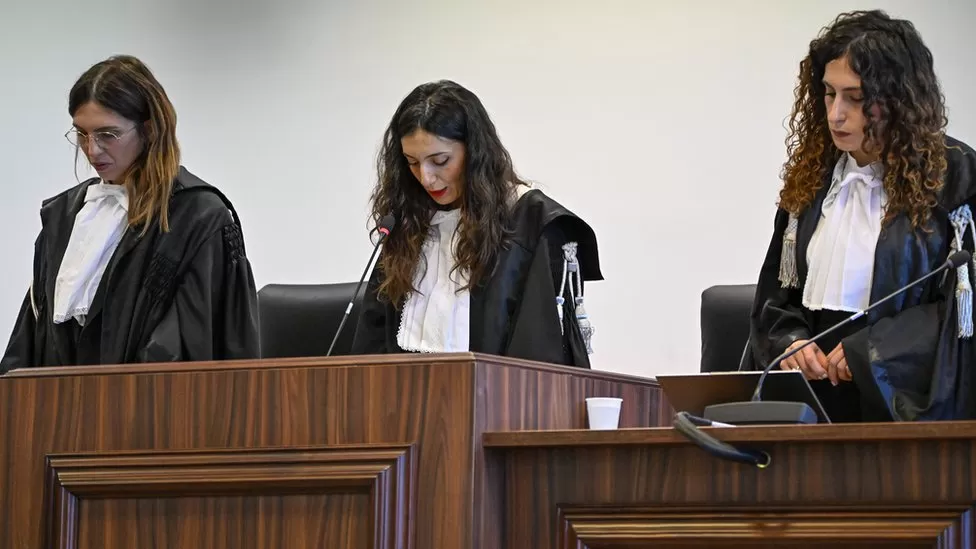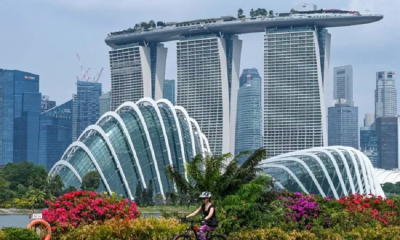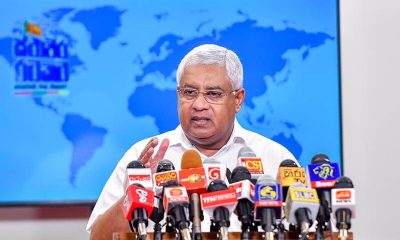Foreign News
Italy mafia trial: 200 sentenced to 2,200 years for mob links

More than 200 defendants in one of Italy’s biggest mafia trials for generations have been sentenced to a total of more than 2,200 years in jail.
The three-year trial saw individuals allegedly linked to the ‘Ndrangheta sentenced for crimes ranging from extortion to drug trafficking. Those sentenced included a former Italian senator, though the verdicts can still be appealed.
The ‘Ndrangheta is one of Europe’s most influential criminal organisations.
The case illustrated the mob’s broad influence over the politics and society of southern Italy. Experts said the convictions of white collar workers, including local officials, businessmen and politicians, showed the far-reaching impact of organised crime on Italian institutions.
Among the most notable people to be sentenced was Giancarlo Pittelli, a lawyer and former senator for ex-premier Silvio Berlusconi’s party Forza Italia. Pittelli received an 11-year sentence for collusion with a mafia-type organisation.
Others convicted included civil servants, professionals across various industries and high-ranking officials, who were critical to the ‘Ndrangheta’s success in infiltrating the legitimate economy and state institutions.
More than 100 defendants were acquitted.
The judges presiding over the case were put under police protection over fears for their safety.
Originating in the impoverished region of Calabria, the ‘Ndrangheta is considered one of the world’s most dangerous criminal organisations. It is estimated to control as much as 80% of Europe’s cocaine market.
The gang boasts an estimated annual turnover of around $60bn (£49bn).
The trial was held in a call centre on the outskirts of the town of Lamezia Terme, converted into a high-security courtroom equipped with cages to hold the defendants and large enough to hold some 600 lawyers and 900 witnesses. Charges included murder, extortion, drug-trafficking, loan sharking, abuse of office and money laundering.
Over three years, proceedings demonstrated how the Calabrian syndicate extended its reach across continents, eventually operating as far afield as South America and Australia. Its members infiltrated the local economy, public institutions, and even the health system, rigging public tenders and bribing local officials.
The trial, the largest of its kind since the 1980s, saw judges examine thousands of hours of testimony. Former mobsters turned collaborators with the justice system testified about the activities of the Mancuso family and their associates, who wield extensive control over the province of Vibo Valentia.
The Mancuso family, from the town of Limbadi, are one of the most powerful of the 150 clans which make up the ‘Ndrangheta.
Anna Sergi, a professor of criminology at the University of Exeter, said: “This trial confirms convictions of classic mafiosi, sentenced for offences traditionally more associate with criminal activities, such as extortion or drug trafficking.”
She added: “However, it is important to note how the different types of people involved, including white collar workers, provide a more comprehensive view of the entire province and the connections between various mafia clans.”
Most of the defendants were arrested in December 2019, following an extensive investigation spanning at least 11 Italian regions, which began in 2016. Approximately 2,500 officers took part in raids targeting suspects in Vibo Valentia, an area primarily controlled by the ‘Ndragheta’s Mancuso clan.
More than 50 former mafia members agreed to cooperate with the trial, among them Luigi Mancuso’s nephew, Emanuele.
Their testimony shed light on the inner workings of one of Italy’s most powerful mobs. The trial revealed that ‘Ndrangheta members allegedly concealed weapons in cemetery chapels, used ambulances for drug transportation and diverted public water supplies to grow marijuana.
Those who opposed the organised crime group faced grim consequences, including finding dead puppies and goat heads left in front of their houses, torched cars and vandalised shop windows.
“This first round of sentences demonstrates how challenging it is to combat the ‘Ndrangheta due to its political, economic, and financial connections,” Antonio Nicaso, a writer and organised crime expert, said.
(BBC)
Foreign News
Six police officers killed in Thailand plane crash

Six police officers have been killed in Thailand after their plane crashed into the sea during a test flight for parachute training, police have said.
The small plane was seen crashing into the water at around 08:00 local time (01:00 GMT) on Friday in the Cha-am district, a coastal resort area some 130km (80 miles) southwest of Bangkok.
Royal Thai Police said in a statement on Facebook that five of the officers died at the scene, with a sixth later dying in hospital.
Authorities are examining the aircraft’s black box data recorder to determine the cause of the crash.
(BBC)
Foreign News
More than 20 killed after gunmen open fire on tourists in Indian-administered Kashmir

At least two dozen people have been killed after gunmen opened fire on a group of domestic tourists visiting a popular beauty spot in Indian-administered Kashmir, authorities have told the BBC.
The attack took place in Pahalgam, a picturesque town in the Himalayas often described as the “Switzerland of India”.
The region’s chief minister, Omar Abdullah, said the attack was “much larger than anything we’ve seen directed at civilians in recent years”. Reports suggest that there are a large number of wounded, with some in critical condition.
US President Donald Trump, Russian President Vladimir Putin and EU chief Ursula Von der Leyen were among world leaders who condemned the attacks.
“Deeply disturbing news out of Kashmir. The United States stands strong with India against Terrorism,” Trump said in a post on Truth Social.
Von der Leyen called the Kashmir deaths a “vile terrorist attack”, while Putin expressed “sincere condolences” for the consequences of a “brutal crime”.
India’s Prime Minister Narendra Modi – who cut short his trip to Saudi Arabia in the wake of the attack – said the perpetrators would “be brought to justice”.
“Our resolve to fight terrorism is unshakeable and it will get even stronger,” Modi wrote in a statement on X.
Tuesday’s attack is unusual in that, in three and a half decades of conflict, tourists have rarely been targeted – especially on such a scale.
Home Minister Amit Shah travelled to Srinagar, Kashmir’s largest city, on Tuesday to hold an emergency security meeting.
The region’s Lieutenant Governor, Manoj Sinha, said the army and police had been deployed to the scene.
No group has claimed responsibility for the attack. There has been a long-running insurgency in the Muslim-majority region since 1989, although violence has waned in recent years.
The attack took place in Baisaran, a mountain-top meadow three miles (5km) from Pahalgam.
Vehicles are unable to reach the area where the shooting occurred, Inspector General of Jammu and Kashmir Police Vidi Kumar Birdi told BBC Hindi.
A tourist from Gujarat, who was part of a group that was fired upon, said that chaos broke out after the sudden attack, and everybody started running, crying and shouting.
Video footage shared by Indian media outlets appears to show Indian troops running towards the scene of the attack, while in other footage victims can be heard saying that the gunmen had singled out non-Muslims.
Footage on social media, which has not been verified by the BBC, appears to show bodies lying on a meadow with people crying and pleading for help.
Police said multiple tourists had been taken to hospital with gunshot wounds. The area has been cordoned off and soldiers are stopping vehicles at checkpoints. A joint search operation by the Indian army and Jammu and Kashmir police is ongoing.
Several protests have been organised for Wednesday, according to Indian media.
Since the 1990s, an armed separatist insurgency against Indian rule in the region has claimed tens of thousands of lives, including those of civilians and security forces.
The Himalayan region was divided following India’s independence from Britain, partition and the creation of Pakistan in 1947.
The two uclear armed states both claim the region in its entirety and have fought two wars and a limited conflict over it in the decades since.
Some 500,000 Indian soldiers are permanently deployed in the territory. The government claims the security situation has improved and violence has come down since Modi revoked Kashmir’s partial autonomy in 2019, although there are still incidents of violence.
The last major attack on civilians occurred in June 2024 when nine people were killed and 33 injured after militants opened fire on a bus carrying Hindu pilgrims. In 2019, a suicide bombing in Indian administered Kashmir killed at least 46 soldiers and prompted Indian airstrikes on targets in Pakistan.
Pahalgam is a popular tourist destination, both domestically and internationally, and in recent years the government has attempted to encourage further tourism to the region.
Around 3.5 million tourists visited Kashmir in 2024, according to official figures.
[BBC]
Foreign News
Gunmen shoot 12 dead at Ecuador cockfight

Police in Ecuador say they have arrested four people in connection with an attack by gunmen at a cockfighting ring in which 12 people died.
Weapons and replica police and army uniforms were seized during police raids in the north-western Manabí province on Friday – a day after the attack in the rural community of La Valencia.
Footage of the attack shared on social media showed gunmen entering the ring and opening fire, as terrified spectators dived for cover.
Reports in local media suggested the attackers in fake military gear were members of a criminal gang whose rivals were at the cockfight.
A criminal investigation has been launched by the provincial authorities.
As many as 20 criminal gangs are believed to be operating in the Latin American country, vying for control over major drug routes.
Ecuadorean President Daniel Noboa has said that about 70% of the world’s cocaine now flows through Ecuador’s ports before being shipped to the US and Europe.
The drug is smuggled into Ecuador from neighbouring Colombia and Peru – the world’s two largest producers of cocaine.
This January saw 781 murders, making it the deadliest month in recent years. Many of them were related to the illegal drug trade.
[BBC]
-

 News6 days ago
News6 days agoFamily discovers rare species thought to be extinct for over a century in home garden
-

 Features4 days ago
Features4 days agoRuGoesWild: Taking science into the wild — and into the hearts of Sri Lankans
-

 Foreign News7 days ago
Foreign News7 days agoChina races robots against humans in Beijing half marathon
-

 News4 days ago
News4 days agoOrders under the provisions of the Prevention of Corruptions Act No. 9 of 2023 for concurrence of parliament
-

 Features5 days ago
Features5 days agoNew species of Bronzeback snake, discovered in Sri Lanka
-

 Features6 days ago
Features6 days agoThe ironies of history
-

 News3 days ago
News3 days agoProf. Rambukwella passes away
-

 News5 days ago
News5 days agoPhoto of Sacred tooth relic: CID launches probe






















